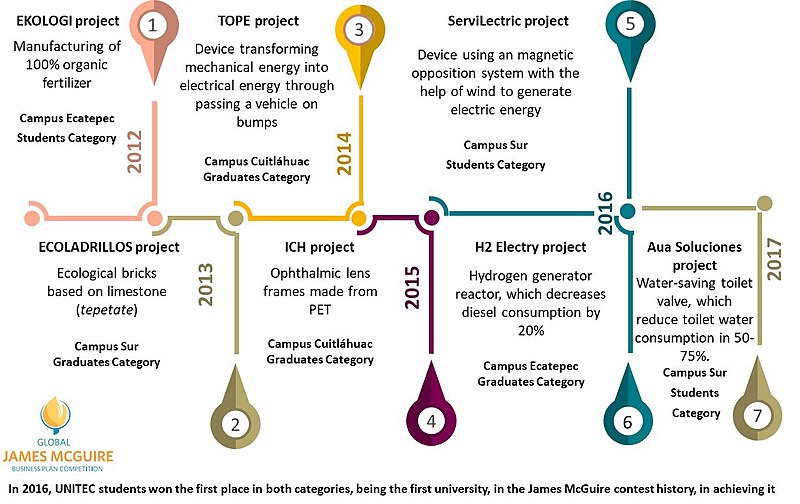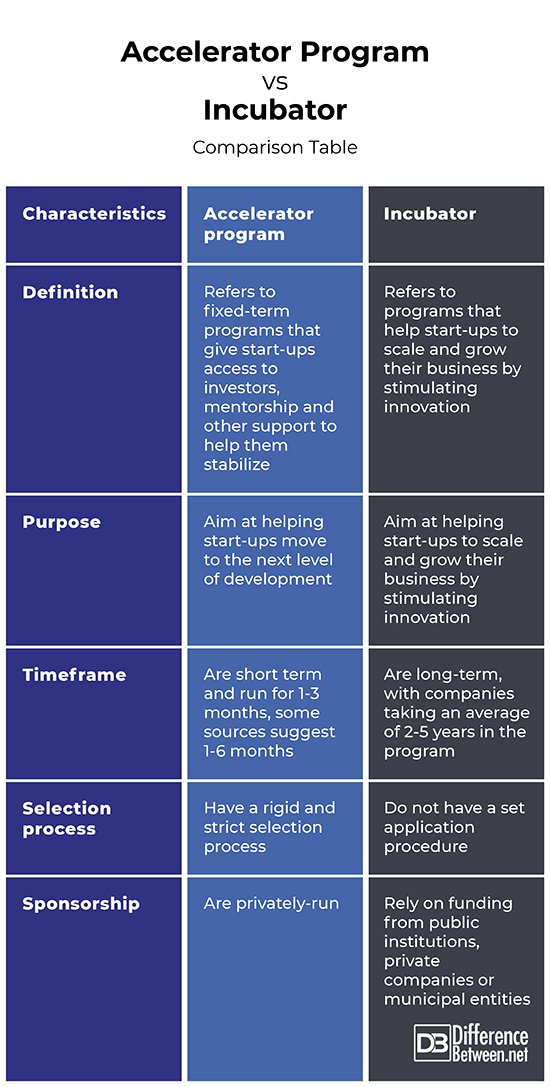Difference Between Accelerator Program and Incubator
Start-ups are often faced with business hurdles, which often negatively impact business growth. To counter this, different programs have been developed to provide guidance and offer help in the early years of a business such as an accelerator and incubator programs. Although these two terms are often assumed to represent the same concept, they have differences as explained in the article below.

What is an Accelerator Program?
These are fixed-term programs that give start-ups access to investors, mentorship and other support to help them stabilize. They aim at helping start-ups move to the next level of development. Accelerator programs are common among businesses that are beyond the early stages of establishment and can stand on their own but need peer support and guidance.
This program also give start-ups access to shared office spaces, technical and logistical resources not to mention networks to other businesses.
Types of accelerator programs include;
- Seed programs- These focus on building up business fundamentals of less mature start-ups
- Second-stage programs- These focus on connecting more mature start-ups to a full range of opportunities and support
They are also short term and run for 2 to six months.

What is an Incubator?
Often funded by public institutions, private companies or municipal entities, these are programs that help start-ups to scale and grow their business by stimulating innovation. They have no fixed timelines and do not operate on specific schedules. Although some incubators have application processes, they also work through suggestions by trusted partners. They can also be focused on a specific market such as technology start-ups.
Incubator programs help start-ups validate business plans, develop their ideas and help them network with other start-ups. The programs are also long-term, with companies an average of two years in the program.
Similarities between Accelerator program and Incubator
- Both provide start-ups with strong support systems
Differences between Accelerator program and Incubator
Definition
Accelerator program refers to fixed-term programs that give start-ups access to investors, mentorship and other support to help them stabilize. On the other hand, incubators refer to programs that help start-ups to scale and grow their business by stimulating innovation.
Purpose
While accelerator programs aim at helping start-ups move to the next level of development, incubator programs aim at helping start-ups to scale and grow their business by stimulating innovation.
Timeframe
Accelerator programs are short term and run for 2 to six months. On the other hand, incubator programs are long-term, with companies taking an average of two years in the program.
Selection process
While accelerator programs have a rigid and strict selection process, incubator programs do not have a set application procedure.
Sponsorship
While accelerator programs are privately-run, incubators rely on funding from public institutions, private companies or municipal entities.
Accelerator program vs. Incubator: Comparison Table

Summary of Accelerator program vs. Incubator
Accelerator program refers to fixed-term programs that give start-ups access to investors, mentorship and other support to help them stabilize. It is a short term program that runs for two to six months and aims at helping start-ups move to the next level of development. On the other hand, incubators refer to programs that help start-ups to scale and grow their business by stimulating innovation. It is long-term and aims at helping start-ups to scale and grow their business by stimulating innovation.
- Difference Between Profit Center and Investment Center - July 2, 2022
- Difference Between Anti-Trust and Anti-Competition - June 6, 2022
- Difference Between Stocktaking and Stock Control - June 6, 2022
Search DifferenceBetween.net :
Leave a Response
References :
[0]Denn S& Busulwa R. Startup Accelerators: A Field Guide. John Wiley & Sons Publishers, 2020. https://books.google.co.ke/books?id=hKjDDwAAQBAJ&printsec=frontcover&dq=Difference+between+Accelerator+program+and+Incubator&hl=en&sa=X&ved=2ahUKEwi8ucP-nJDqAhUD8BoKHTZvAUAQ6AEwAHoECAUQAg#v=onepage&q=Difference%20between%20Accelerator%20program%20and%20Incubator&f=false
[1]Marinković S & Jasko O. Symposium proceedings - XV International symposium Symorg 2016: Reshaping the Future Through Sustainable Business Development and Entepreneurship. University of Belgrade, Faculty of Organizational Sciences , 2016. https://books.google.co.ke/books?id=5TkLDgAAQBAJ&pg=PA1461&dq=Difference+between+Accelerator+program+and+Incubator&hl=en&sa=X&ved=2ahUKEwi8ucP-nJDqAhUD8BoKHTZvAUAQ6AEwAXoECAQQAg#v=onepage&q=Difference%20between%20Accelerator%20program%20and%20Incubator&f=false
[2]Fabozzi F. Entrepreneurial Finance and Accounting for High-Tech Companies. MIT Press, 2016. https://books.google.co.ke/books?id=BiZ5DQAAQBAJ&pg=PA110&dq=Difference+between+Accelerator+program+and+Incubator&hl=en&sa=X&ved=2ahUKEwi8ucP-nJDqAhUD8BoKHTZvAUAQ6AEwAnoECAEQAg#v=onepage&q=Difference%20between%20Accelerator%20program%20and%20Incubator&f=false
[3]Image credit: https://en.m.wikipedia.org/wiki/File:Business-incubator-UNITEC.jpg
[4]Image credit: https://commons.wikimedia.org/wiki/File:UNLOCK_Accelerator_Themenfelder.jpg
